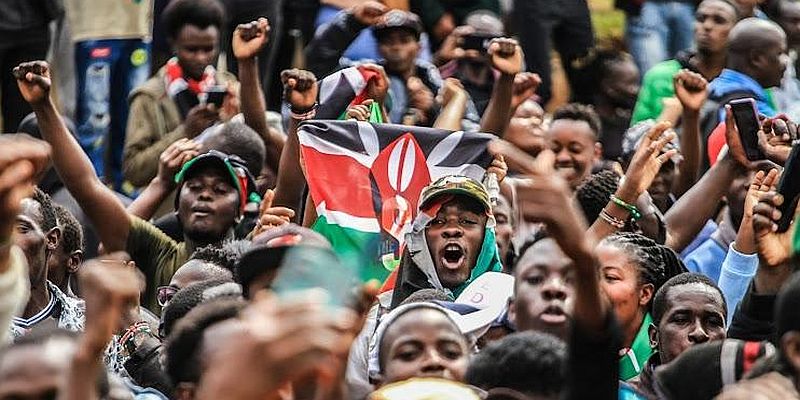Kenya: Genz Protests Call for Economic Overhaul

The organization, coordination, and mobilization of the GenZ protests in Kenya through technology and social media have surprised everyone. Alicida Honwana in a Ted talk outlines different youth protests in other parts of Africa and how they led to the collapse of governments. She depicts youth as a vibrant force of transformation in Africa. The youth in Africa are in a situation she calls Waithood. They are waiting to transition to adulthood. This waithood has become long because of hard economic times. They have no jobs and cannot leave their parent’s home or start their own families.
Africa’s poor governance and economic situation are responsible for this situation. Poor governance is exemplified in the distribution of resources. In Kenya, the government's allocation of resources is heavy at the top. The offices of the First and Second Lady as well as that of the wife of the Principal Secretary were allocated resources whose use was not clearly outlined or accounted. Cabinet secretaries were allocated resources for housing, security, and transport. All these allocations were made when essential services like health and education were denied funds.
Untamed corruption is rife. The Kenyatta Hospital CEO and the Land Registrar in Thika have recently been accused of corruption. Corruption is widespread in many government offices. To receive imaging, blood draw, and radiotherapy in a public hospital, one must part with money for the attendant. Even mortuary attendants require bribes. This leaves many helpless, especially the youth who have no money and they do desperate things like the man who smuggled his baby out of Kenyatta hospital in a paper bag.
At the helm of Kenya’s economy are three neoclassical economists. They believe in the role of the market in the distribution and production of goods and services, the setting of prices by demand and supply, minimal welfare infrastructure, and the raising of taxes. They do not believe in providing safety nets for the poor because they believe they are not hard-working enough or they are lazy. That is why they come up with punitive tax policies.
They have contributed to the entrenchment of the neoliberal economy which was initiated in the 1980s and 1990s where the government was forced to cut down on expenditure, cut employment, float exchange rates, introduce cost sharing in government services, and sell out government parastatals. The structural adjustments were meant to enable respective governments to pay their loans. Unfortunately, they did not help because target countries continue to borrow loans for most projects. Unfortunately, most of these projects do not meet the demands of the youth.
The SGR and the Superhighway or the Express Highway do not cater to youth interests, goods, and services. The youth are interested in job creation in the digital economy and need the expansion of broadband and cheap Wi-Fi. Wi-Fi in Kenya is supplied by private providers who charge an arm and a leg. The Internet bundles are also supplied by private providers and affect youth participation in the digital economy. This makes the work of content creation, digital trading, e-commerce, and digital marketing expensive.
The issue of youth demands rethinking of the whole economy Even if a youth grew avocadoes for export, how many avocadoes would he or she export to pay for a spouse's hospital bill at Nairobi Hospital or how many would he export to buy laptops for his three children or finance a wedding? The youth are desperate and frustrated and need a more friendly alternative economy that will include safety nets like unemployment benefits, food stamps, children support, education loans, talent support, and scholarships.
The youth are challenging taxation without representation and demonstration of how the taxes are spent. They are calling upon neoclassical economists to tone down their policies to avoid further chaos and listen to everyone. The Tunisia, Libya, and Egypt governments were brought down by well-coordinated youth movements. Some of the countries that experienced the Arab Spring have never recovered.
Kenyan neoclassical economists should use knowledge that is generated in local universities. They should stop relying on six-week missions by World and IMF consultants and rely on people who are participants, consumers, and development researchers.
We need more creative models of the economy that incorporate care in the management, production, and distribution of goods and services. Focusing on the market alone or demand and supply alone will not work.
Pacing of the projects is also important. We should not be on cat and rat race to complete projects and compete with Singapore or other developed countries. We need to know our boundaries and limits of catching up. The structural adjustment programs destroyed our self-reliant model of development which ensured we developed at our pace. The accelerated development model initiated by structural adjustment programs just replaced old capitalists with new capitalists and left out the majority and these majority are the youth who were born during this period.
In the words of Alicinda, refuse to listen to the youth at your peril. An alternative economy such as the one proposed by the Diverse Economy Collective (DISE) led by Caroline Hossein of the University of Toronto is crucial.
By Mary Njeri Kinyanjui PhD
Independent Researcher and Founder, Beyond Knowledge Horizons
